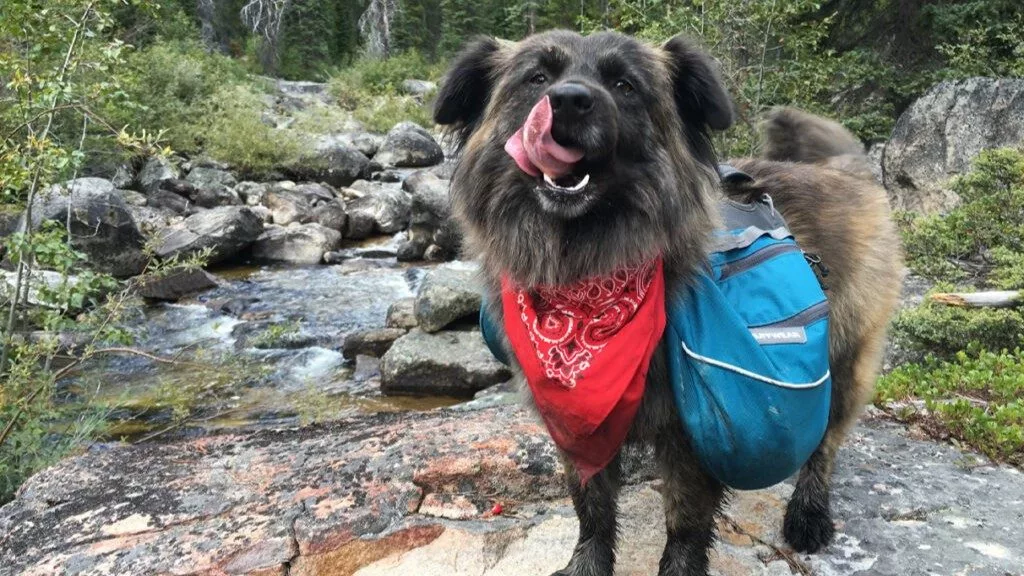PULLMAN, WA – As a retired veterinarian, Dr. Ken Baber didn’t have to be told how dire the situation was when his 12-year-old dog, Jessie, was diagnosed with a rare type of tumor known as a pheochromocytoma on her adrenal gland.
Such tumors are notorious for aggressively spreading and becoming entangled with the countless surrounding tiny and delicate blood vessels. Adrenal glands are also nestled between two major arteries, making surgical removal a risky procedure requiring the expertise of a highly skilled surgeon.
Only five hours from his home, Baber found that expertise at Washington State University’s Veterinary Teaching Hospital, where Dr. Boel Fransson, one of the nation’s top veterinary surgeons, would successfully remove the tumor during a minimally invasive laparoscopic procedure.
“I honestly don’t think we could have received this level of care anywhere else, and I say that as a pet owner and as a retired vet,” Baber (’83 DVM) said.
Jessie found her way into Baber’s life at just 10 months old when she was brought to his Mount Vernon, Washington, clinic for a health check after being rescued by an area organization from a California shelter.
“I happened to be the vet they would sometimes bring dogs to, and I just fell in love with her. She didn’t even get the chance to leave the clinic, and I’ve had her ever since,” Baber said.
Jessie first showed symptoms of the tumor in mid-October when she awoke late in the night and began frantically pacing.
“I thought there must be some animal outside because she was really agitated, panting uncontrollably, shaking, tremors, elevated pulse,” Baber said. “It was almost like a dog experiencing anxiety over fireworks. After about an hour, she settled down.”
He wrote the incident off, but Baber knew something was seriously wrong when the episodes continued.
Testing at local veterinary clinics eventually discovered the cause, a pheochromocytoma on Jessie’s left adrenal gland. In dogs, the adrenal glands are located in the abdomen, just in front of the kidneys. These tumors can cause the body to produce excessive amounts of hormones responsible for the fight-or-flight response, leading to anxiety and, in severe cases, cardiac arrest.
Baber immediately began searching for a surgeon willing to perform an adrenalectomy to remove the affected gland and tumor.
“It takes some courage to do adrenalectomy,” Baber said. “They’re fraught with potential complications, so it really should be done by an experienced board-certified surgeon.”
Fortunately, an opening at WSU became available after a cancellation. Even more fortunate, Fransson would be the surgeon.
Baber was familiar with Fransson’s reputation. Nearly 15 years earlier, he had taken a workshop on laparoscopic surgery led by Fransson.
“I couldn’t believe my good fortune that she might be able to perform it,” he said. “All of a sudden, we felt really optimistic.”
A month and a half after the first symptoms, Jessie was at WSU for surgery. While adrenal tumors can be removed through traditional open surgery, laparoscopic procedures are preferred when the tumor hasn’t spread, as they lead to shorter hospital stays and faster recovery.
“We like to catch these tumors early — like with Jessie — because they can be very aggressive and start growing into the blood vessels,” Fransson said.
With surgical resident Dr. Natalie Heape assisting, Fransson made three small incisions in Jessie’s abdomen, carefully maneuvering a tiny camera and specialized instruments to separate the tumor from delicate blood vessels and surrounding tissue. After two hours and without complications, the tumor and adrenal gland were successfully removed.
Jessie was back home just days later, and now several months out, she is no longer experiencing symptoms of the tumor. Fransson said the prognosis for Jessie is good, as almost nine of 10 dogs successfully undergoing the procedure are still alive after three years.
For Baber, every extra day with Jessie is a gift.
“We don’t know what the future holds for Jesse,” he said, “but we’re hoping we’ve bought her some years of continued robust health and that she can remain active as she gets older and more gray, just like me.”
